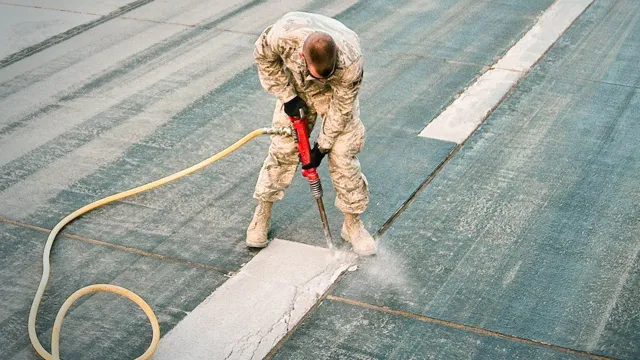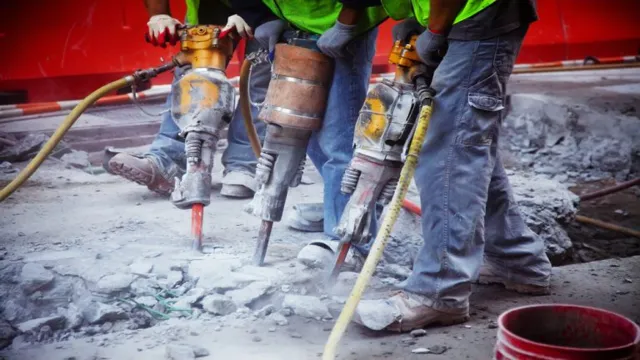Will a Jackhammer Break Rock? Discover the Best Techniques for Breaking Rocks Easily

If you’re looking to break rock or concrete, a jackhammer might be the first tool that comes to mind. These powerful tools can make quick work of tough materials, but can they really break solid rock? That’s a common question, and the answer is a resounding yes – under certain conditions, a jackhammer can easily crack even the toughest rock formations. Of course, the specific capabilities of a jackhammer will depend on a range of factors, from its power to the shape and size of its bits.
Still, in the hands of a skilled operator, a jackhammer can be an incredibly effective tool for breaking through rock, whether you’re working on a construction project or trying to clear a space in your backyard. In this blog, we’ll explore the science behind jackhammers and how they work to break rock. We’ll also delve into the various types of rock and concrete that are easiest for jackhammers to break, and what you can expect if you’re using one of these powerful tools for your own DIY projects.
From tips on technique to advice on choosing the right jackhammer for your needs, we’ll cover everything you need to know about whether a jackhammer can break rock.
What is a Jackhammer?
If you’re wondering if a jackhammer can break rock, the answer is yes! A jackhammer, also known as a pneumatic drill, is a powerful tool used for demolition and construction projects. It is designed to break up concrete, asphalt, and even rocks. Jackhammers work by delivering high-impact blows, generated by compressed air or an electric motor, to the surface being worked on.
While they can be difficult to handle due to their weight and noise level, they are extremely effective at breaking apart tough materials. In fact, the force of a jackhammer can be compared to that of a needle breaking through a piece of paper. So if you’re looking to break up some stubborn rocks, a jackhammer is definitely up to the task!
How Does a Jackhammer Work?
A jackhammer is a powerful tool that is commonly used in construction and demolition work to break concrete, asphalt, and other hard surfaces. This tool operates using an internal mechanism that converts high-pressure air into rapid and powerful up-and-down movements of a steel piston. As the piston moves up and down, it strikes a chisel or point attached to the tool’s end, which then repeatedly hits the surface being worked on until it breaks apart.
The force of each stroke is so strong that it causes small shock waves, which can be felt and heard from a distance. Jackhammers are essential in many types of construction work because they can break through tough materials much faster and easier than other hand tools. However, they must be used carefully and with proper safety equipment to avoid injury.

Different Types of Jackhammers
A jackhammer, also known as a pneumatic drill, is a powerful tool used for demolition and breaking through tough surfaces like concrete and rocks. It is a hand-held machine that works by using compressed air to drive a piston up and down to create impact energy. This energy is then transmitted to the chisel or point, which is used to break up the material.
There are different types of jackhammers available for various applications. For example, the electric jackhammer is ideal for indoor use as it is less noisy and produces no emissions. On the other hand, the gasoline-powered jackhammer is more suitable for outdoor jobs that require more power.
There are also specialized jackhammers such as the paving breaker used for breaking up pavement, and the rock drill used for drilling rock. Whatever type of jackhammer you choose, it is important to use it safely and wear protective gear such as gloves, goggles, and earplugs to prevent injury.
What is Rock?
When it comes to breaking rock, a tool that is often used is a jackhammer. But will a jackhammer really break all types of rock? The answer is not that simple. It really depends on the type of rock that you are trying to break.
A jackhammer can break rocks that are typically softer, such as limestone, sandstone, or shale. However, rocks that are harder, such as granite or quartz, may require stronger tools than a jackhammer. In fact, it’s possible that a jackhammer might not be able to break through these harder types of rock at all.
Therefore, before using a jackhammer to break up rock, it’s important to determine the type of rock that you’re dealing with to ensure the proper tools are used. Remember, while a jackhammer can be a useful tool in breaking up certain types of rock, it’s not necessarily the answer for all types of rock-breaking tasks.
Types of Rocks
Rock is a naturally occurring solid substance that is made up of minerals, crystals, or other mineraloids. It is the fundamental building block of the Earth’s crust and can be found in various forms, from mountains to pebbles on the beach. The formation of rocks is a gradual and continuous process that takes place over millions of years, and their composition can vary depending on the type of minerals and elements that are present.
There are three main types of rocks: igneous, sedimentary, and metamorphic. Igneous rocks are formed from cooled and solidified lava or magma, while sedimentary rocks are formed from the accumulation of sediments such as sand, shells or mud. Lastly, metamorphic rocks are formed by the transformation of existing rocks under high temperature and pressure conditions.
Each type of rock has its own unique characteristics, making it important to study and understand the world of rocks. By learning about rocks, we can gain insight into the geological history of the Earth and better appreciate the natural beauty that surrounds us.
Rock Strength
Rock, in basic terms, is a naturally occurring, solid substance made up of one or more minerals. Rocks are formed through geological processes that involve the accumulation of minerals and organic matter over millions of years. The strength of a rock is determined by its composition, structure, and density.
Igneous rocks, which are formed from the cooling and solidification of magma or lava, tend to have high strength due to their crystalline structure. Sedimentary rocks, on the other hand, are composed of layers of sediment that have been compacted and cemented together over time. Their strength depends on the type of sediment and the degree of compaction and cementation.
Metamorphic rocks are created when existing rocks are subjected to high heat and pressure. Their strength is determined by the degree of metamorphism and the mineral composition. Understanding the strength of different types of rocks is critical in various fields, including construction, mining, and geology.
Rock Density
Rock is a naturally occurring solid material made up of different minerals and organic substances. It can be found in various sizes, shapes, and colors and is one of the fundamental building blocks of the Earth’s crust. Rocks are broadly classified into three major categories based on how they were formed: igneous, sedimentary, and metamorphic.
Each of them has its unique features and properties. Rocks play a crucial role in sustaining life on Earth, acting as a source of minerals for plants and animals. They also serve as vital materials for construction and manufacturing.
Understanding rocks’ physical and chemical properties is essential in several fields, including geology, mining, engineering, and archaeology. The density of rock is a crucial parameter that determines several of its properties, including strength, durability, and permeability. Rock density refers to the mass of a rock per unit volume and can vary significantly depending on several factors such as its geologic origin, mineral composition, porosity, and water content.
For instance, igneous rocks such as granite and basalt are generally denser than sedimentary rocks like sandstone and shale. A rock’s density can also be affected by the presence of voids and fractures within it. Higher-density rocks are usually more resistant to weathering and erosion, making them more suitable for heavy construction and as road aggregates.
In summary, rock is a crucial aspect of the Earth’s surface, formed through various geological processes and made up of different minerals. Understandably, knowing the various rocks and their density could be of enormous benefit in areas such as construction, engineering, mining, and other fields. Therefore, identifying and classifying rocks by their density is crucial in various geologic and engineering applications.
Can a Jackhammer Break Rock?
If you’re wondering whether a jackhammer can break rock, the answer is a resounding yes! Jackhammers are powerful tools that can easily break through concrete, asphalt, and even solid rock. These heavy-duty tools make use of a high-frequency percussive force to create a series of rapid impacts that fracture and chip away at the material. However, it’s important to note that the size, strength, and composition of the rock will determine how effective the jackhammer will be.
It’s also crucial to wear protective gear, like gloves and earplugs, when operating a jackhammer to avoid injuries from flying debris and loud noise. Overall, a jackhammer is a versatile and essential tool for heavy construction projects that require some serious rock-busting power.
Factors that Determine Whether a Jackhammer Can Break Rock
When it comes to breaking rock with a jackhammer, there are several factors that come into play. Firstly, the type of rock being broken is crucial. Soft rocks like sandstone, limestone and shale can be easily broken with a standard jackhammer, while harder rocks like granite and basalt require more advanced machinery.
The size of the jackhammer is also important, as bigger jackhammers can deliver more force than smaller ones. Additionally, the speed and frequency of the hammering also affects the ability to break rock. If the hammering is too slow, the rock won’t break, while too much force can damage the jackhammer.
Finally, the skill of the operator can also play a huge role in breaking rock with a jackhammer, as an experienced operator will know how to use the machine effectively and safely. With the right equipment, knowledge, and technique, a jackhammer can certainly break rock, but it’s important to consider all the factors at play before attempting it.
Examples of Rocks Jackhammers Can Break
When it comes to breaking rock, few tools are as effective as a jackhammer. These powerful devices use a steel bit that moves back and forth rapidly, striking the rock with immense force. While jackhammers are capable of breaking many different types of rock, some are harder than others.
One common type of rock that jackhammers are used to break is concrete – this material can withstand a lot of pressure, but the repeated impacts of a jackhammer can eventually cause it to crumble. Another type of rock that jackhammers can break is granite. This type of rock is known for its density and durability, but with enough force, a jackhammer can still break it apart.
Other types of rock that are commonly broken with a jackhammer include sandstone, limestone, and shale. Whether you’re working on a construction site or just doing some home renovation, a jackhammer can be an invaluable tool for breaking through tough rock material.
Conclusion
In conclusion, asking if a jackhammer can break rock is a bit like asking if a knife can cut butter – the answer seems obvious. However, just as a dull knife would struggle to make a clean cut, a weak or faulty jackhammer may not be up to the task of breaking through certain types of rock. But with the right tool in hand, and a steady hand controlling it, a jackhammer can make short work of even the toughest rocks.
So the next time you’re faced with a stubborn boulder, fear not – a trusty jackhammer should do the trick!”
FAQs
How effective is a jackhammer at breaking rock?
A jackhammer is a powerful tool that can break through tough rock surfaces with ease. However, the effectiveness of the jackhammer depends on the size and strength of the equipment.
What type of rock can a jackhammer break?
A jackhammer is capable of breaking through most types of rock, including granite, sandstone, and limestone.
Will a jackhammer cause damage to surrounding areas when breaking rock?
Yes, the powerful vibrations caused by a jackhammer can cause damage to surrounding areas, such as buildings, foundations, and other structures. It is important to take necessary precautions and use proper techniques when using a jackhammer.
Can a jackhammer be used underwater to break rock?
Yes, there are specific jackhammers designed for use underwater that are capable of breaking through rock surfaces. These jackhammers are commonly used in marine construction projects.
What safety precautions should be taken when using a jackhammer to break rock?
It is important to wear proper protective gear, such as earplugs, safety glasses, and a hard hat. Operators should also be trained on how to properly use the equipment and avoid potential hazards, such as hitting underground utilities or gas lines.
Can a jackhammer be rented or is it only available for purchase?
Jackhammers are widely available for rent at many hardware stores and construction equipment rental companies.
Is it possible to break rock without a jackhammer?
While a jackhammer is a powerful tool for breaking rock, there are other methods such as traditional drilling and blasting techniques that can also be used. However, these methods may be more time-consuming and require more specialized equipment.



